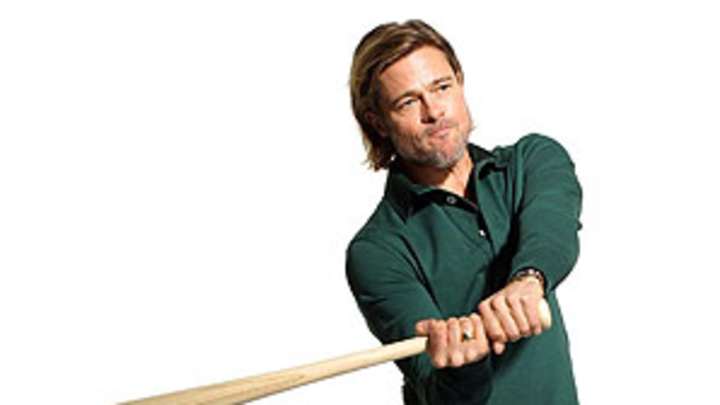Brad Pitt on Beane, baseball movies and the romance of Moneyball

It's tough to steal a scene from Brad Pitt, but Kerris Dorsey pulls it off in Moneyball, strumming a guitar and singing the lyrics to Lenka's "The Show," while Pitt -- playing Oakland A's GM Billy Beane -- looks on, dumbfounded by her talent.
There was Dorsey, making the rounds at the party following Monday night's Moneyball premiere in Oakland. Hovering nearby was her proud mom, who told me that Kerris also happens to be a Junior Olympic caliber participant in rhythmic gymnastics.
One measure of how long it took to get this movie from the printed page (Michael Lewis's book came out in 2003) to the big screen is the age difference between the 13-year Dorsey, who plays Billy's daughter Casey Beane, and the real Casey Beane, who spent the summer working at a health care think tank in Washington D.C., and is now a senior at Kenyon College.
(One day over the summer, Beane got a call from Casey, who told him, "Dad, I just watched the trailer. That's my haircut from third grade!'")
It says something about our gender that so many guys asked me, when found out I'd interviewed Brad Pitt for this week's Sports Illustrated cover story on Moneyball: "Is he really short?" Clearly, they hoped he is.
I don't know, I told them. He was in London; we did the interview on the phone. But there was Pitt on the stage of Oakland's Paramount Theater Monday night -- looking every bit of 5'10" or so -- along with (among others) co-star Jonah Hill, Lewis, Dorsey, producers Rachael Horowitz and Michael DeLuca, A's GM Billy Beane and Bennett Hill, the movie's third director, the man who shepherded this vehicle to the finish line, and in whose voice one heard notes of weariness and relief as he concluded, "we give you ... Moneyball."
"This film had so many stops and starts," said Pitt, who was offered the role of Beane four years ago. "It really happened only because Amy Pascal stuck with us." Pascal is Sony's head of motion pictures. Lewis probably came closer to the truth when he told me, "As long as Brad Pitt wanted to make this movie, it was going to get made."
At a certain point, Beane admits, "my assumption became, 'They're never gonna make this thing.' But once Brad got attached to the role, that was when you saw things speed up."
At the start of our conversation, Beane felt compelled to offer this explanation: "Rather than refer to him as Brad Pitt throughout this interview, I will refer to him as 'Brad,'" -- which was not to imply, Beane made clear, that he was name-dropping, or implying an especially close friendship with the megastar Pitt.
Yet, the two did become, if not friends, friendly. "I felt quite comfortable with him," Pitt says. "He's very charismatic, sharp as a knife, and, I gotta say, funny as hell."
Pitt the thespian was drawn to the complexities of Beane's character. As a one-time baseball wunderkind who couldn't cut it in the big leagues, Beane is a poster-boy for the fallibility of evaluators of baseball talent ... who makes his living evaluating baseball talent.
"One of the things I think the story accurately portrays," Pitt went on, "is how imperfectly we understand ourselves. We are so full of contradictions. Our weaknesses are our strengths and our strength are our weaknesses, and those things are constantly in flux."
When Pitt described the story as "very mature," he wasn't just talking about the fact that it aged almost a decade before the movie finally got made. He meant that the movie is grown up in in the way that resists Disney-fication. Pitt and Miller shared a vision for a film that avoided the sentimentality and bathos in which certain other baseball movies wallow. I'm thinking here more of Field of Dreams than The Natural, which, despite its treacle, Pitt describes as "one of the greats," a film that "captures the romance of the sport."
He described Moneyball as "the anti-Natural," but went on to say that "as much as it seems we're trying to deny the romance of baseball" -- a reference to the sabermetrician's tendency to reduce players to numbers on a spreadsheet -- "it's still that romantic moment you couldn't have planned that wins the 20th game."
He's talking about Moneyball's climactic moment, which, while less grandiose than Roy Hobbs' homer off the floodlights in The Natural, is more satisfying, because it really happened.
Says Pitt, "It's those contradictions that give me comfort."
He also took comfort in playing Beane, whom he befriended, and whom he defends from accusations of "egomania" from people who believe, mistakenly, the GM somehow commissioned Lewis to write this book about him. ("The funny thing about Billy," says Lewis, "is that he's really uncomfortable being watched, being observed, and he's very uncomfortable being analyzed. He never really wanted me to write about him, and was shocked when he saw what the book was.")
Pitt spoke of the "great responsibility" of portraying someone "who is a real character, and still alive, especially if they have family members who are going to see it. You wanna do 'em right.
"Of course there's no way that we're going to capture, in two hours, a complete portrait of someone's life." He expressed confidence, in this case that the movie captures "the gist" of Beane's character. "We're somewhere in the ballpark."
